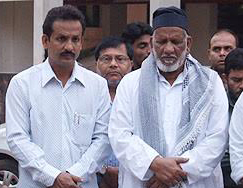Mangaluru, May 8: Maulana Ebraheem Muhammad Shafi, the father of Mangaluru based journalist Abdussalam Puthige, passed away after a brief period of illness on Sunday night at his residence near Moodbidri on the outskirts of the city.
 The octogenarian is survived by his wife, five sons, three daughters and a large number of relatives, disciples, friends and well-wishers.
The octogenarian is survived by his wife, five sons, three daughters and a large number of relatives, disciples, friends and well-wishers.
Even though he had earned Bachelor degree in Unani Medicine & Surgery (BUMS), he was a theologian and cleric by profession.
For decades he treated thousands of patients for free of cost. He was popularly known as Shafi Mualana among Muslims, while local Hindus and other non-Muslims respected him as guru'.
For a long period he had served as the Imam of a prominent mosque in Puthige neighbourhood of Mooodbidri. His family is one of the respected families in Puthige.
Albeit he hailed from Kerala and had proficiency in Malayalam, English and Arabic languages, after settling in coastal Karnataka he learnt Urdu and other local languages too.
All his children are known for social work, entrepreneurship and philanthropy. While his eldest son launched Vartha Bharati Kannada daily over a decade ago, his youngest son Abdul Ahad is a Superintendent of Police.
His second son Abdul Rawoof Puthige is the proprietor of Vishwas Bava builders and founder of Mangaluru based Talent Research Foundation.
Abul Aala Puthige and Umar Farooq Puthige, the third and fourth sons respectively, are the proprietors of Vishwas Rolling Shutters.
Family sources of the deceased said that the funeral prayers will be held on Monday afternoon in his hometown.




Comments
Inna lillahi va inna ilaihi rajioon
he was a great person
May Allah grant him Jannah
may Allah forgive his sins if any
May Allah make Grave lightfull
Heartfelt condolences from Zakria family in Qatar.
May Allah bless him with jannathul firdaus.
Inna lillahi wa Inna ilaihi rajivoon..
m heartiest condolence to the families of maulana mohamed shafie
Inna lillahi wa inna ilayhi raji'un
Inna lillahi wa inna ilahi raji'un
INNA LILLAHI WA INNA ILAHI RAJI'UN
Innalillahi Wa inna Ilahirrajiwoon.
Inna Lillahi wa inna Ilaihi rajioon
Allahummghfirlahu warhamhu, wa aafihim wa'afa anhu!
warzuq'hum Jannathul Firdowse al A'ala
Innalillahi Wa inna ilaihi rajiooon
May allah grant him jannatul firdouse,,,
Ameen...
May Allah grant him paradise and give us death while He is pleased with us.
\To Allah we belong and to him we return\". Indeed! Whatever Allah give or take belongs to him and everything is predestined by him-Prophet Mohammad (PBUH)."
Inna lillah wa inna ilaihi rajiwoon. May allah acceipt his all good deeds and grant him Jannaah.
Aameen
Inna lillahi wa inna ilaihi rajioon
May Almighty Accept all his good deeds
Ameen
Inna Lillaahi wa inna ilaihi raajihoon. Allaahummgfirlahoo warhamhoo wahfu anhu yaa Rabbal Aalameen. ameen.
Innaa Lillahi Wa Innaa Ilaihi Rajivoon. We are from Allah and to HIM we return.
Maulana Ebrahim Muhammed Shafi Saheb is a proud father of professionals in the field of Journalism, Enterpreneurship, Administration and philanthrophy Al-Hamdulillah.
May the departed soul rest in peace. May Allah bless him with the bounties of Jannah and May Allah give sabr (patience) to the grieved family to bear the loss of their dear one.
Heartfelt condolences.
Inna lillahi wa inna ilayhi raji'un
Inna lillahi wa inna ilayhi raji'un
Inna lillahi wa inna ilahi rarji'un
Add new comment